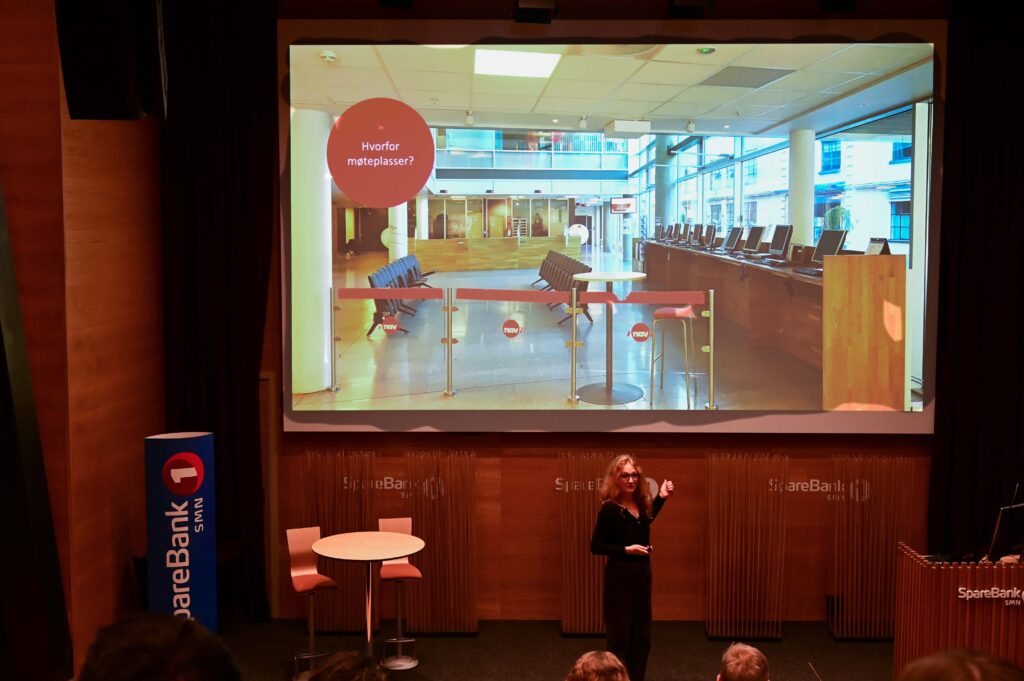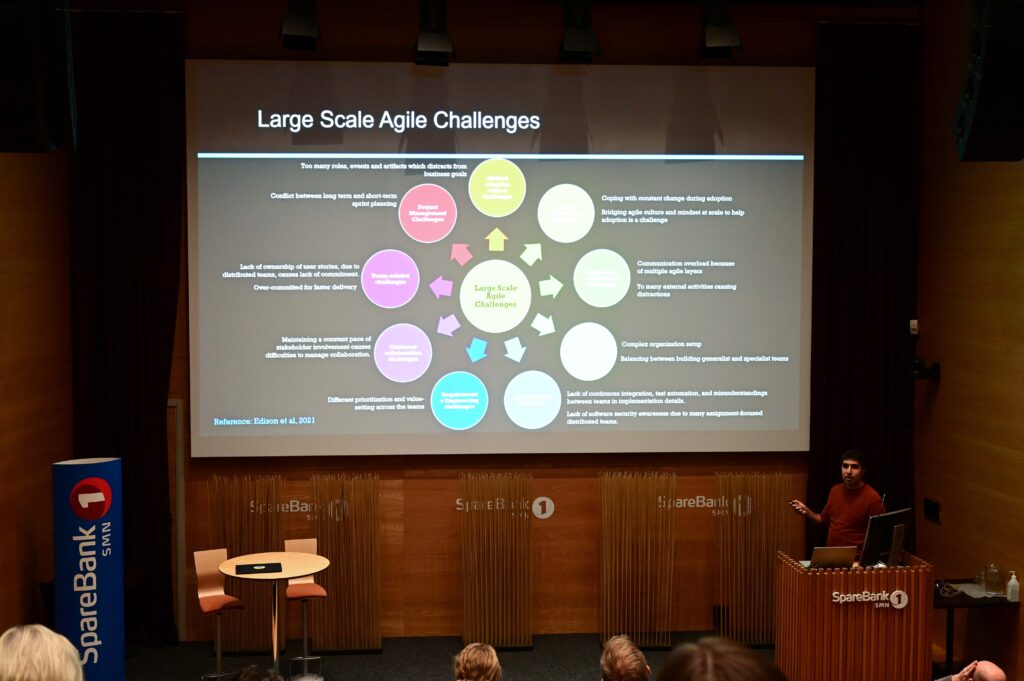Contents
Is digital transformation the solution to our societal sustainability challenges, as many IT people claim? Or is it instead a race to the bottom through the erosion of trust in our societies? This is what our seminar on sustainable digital transformation last Tuesday was about. And do you want to know the answer we came up with? Well, the answer is that it all depends. Read further to get an insight into what we discussed.
Sustainability is a big topic in our societies these days. Although climate-related developments often make the most significant headlines –and with good reason – we should not forget social and economical sustainability. A prerequisite for having socially sustainable public services in the future is that such services continue to develop in line with the egalitarian ideas used in the past to build our trust in our public institutions. Values such as dignity, equity, eigenart, and inclusion should be central to future developments.
The role of IT and digitalization is discussed frequently in relation to sustainability. Many proponents of technology and innovation believe that we cannot achieve our sustainability goals without the help of IT. On the other hand, the negative role of international platforms, algorithmic bias, automation of jobs, standardization, control mechanisms used by authoritarian regimes, and similar challenges also tell us that the picture is not quite so rosy. Digital transformation can be a problem-solver, and at the same time pose a threat to social sustainability in our societies.
At NTNU we currently have several initiatives that look into sustainability from different angles. Sustainability is becoming an underlying topic in our collaboration with our partners. Moreover, NTNU has initiated several targeted sustainability initiatives. Our seminar series on sustainable digital transformations builds on the following initiatives to create an arena for research-based reflection:
- Our newly started project SustainDiT, part of NTNU’s strategic sustainability program.
- Collaboration program for NTNU, NAV, and HMN, where digitalization of public healthcare and welfare services is the main topic.
- NTNU Digital’s Center for sustainable ICT.
This year’s theme for the seminar was healthcare and welfare services. The seminar attracted both practitioners and researchers and consisted of presentations and discussions.
The talks
You can find a complete overview of the program and links to the presentations in the 2022 seminar page. This year we had ten exciting presenters who talked about their research and practice in the first part of the seminar. Presenters were from NAV, St. Olav, and NTNU. The topics that were presented covered several aspects of sustainable digitalization:

- Public encounters are how citizens experience healthcare and welfare services. It was, therefore, no surprise that several presenters talked about the challenges and opportunities related to the digitalization of public encounters. In her keynote speech, Ida Bing Løberg from NAV discussed how digitalization increases the demand for services because of the around-the-clock availability of these services. This implies that front-line employees need to adapt to new coping mechanisms. Anne Wullum Aasback from NTNU talked about how the encounter with NAV users was being supported by an activity plan, a simplified planning tool inspired by Kanban, and related challenges. Camilla Dahl and Silje Andersen from NAV presented an exciting co-creation project about shaping the future meeting places in NAV. Through a process of idea generation inspired by design thinking, Camilla and Silje have collected several scenarios and views on how NAV should be available in our built environments as the provider of welfare services in our society in 2030.
- In his keynote speech, Karl Kristian Larsson from NAV discussed how we should build trust and inject social capital into our digitalization processes, which are often a quest for effectiveness and efficiency. Karl Kristian also discussed how researchers should approach NAV as a complex organization with a specific context and history. “How can researchers help NAV” can be perceived as an intimidating question for a newly-started Ph.D. student. But it is nevertheless an essential question that we researchers should ask when encountering practitioners in general.
- The search for social capital and trust was the topic for several other presentations. Syed Sajid Hussain Shah from NTNU presented a perspective of digital platforms as generators of public value, as opposed to what we often associate with transnational commercial platforms –which is to increase market share. Ilaria Crivellari and Maryam Haghshenas from NTNU presented their ongoing Ph.D. projects, where they look into healthcare platforms and how they can be used to build sustainable care pathways involving multiple stakeholders. Signe Lohmann Lafrenz from St.Olav presented preliminary results from the STUNTH project which focuses on work-related factors and health among hospital workers as Helseplattformen is being implemented in the hospital.
- The last but crucial topic that emerged was related to how we build IT systems in a sustainable way. Gina Lindstad from NTNU talked about her study of tech intermediaries and how they operate in NAV to bridge between users and IT developers. Tangni Cunningham Dahl-Jørgensen from NTNU discussed some of her observations from a large-scale public procurement process of an IT-based childcare system in Norwegian municipalities. Morteza Moalagh from NTNU discussed how agile system development methods can be scaled and the consequences.
The discussions
The second half of the seminar was organized as group discussions. We participated in three groups that were organically emerged as a continuation of the talks from the first half of the seminar. Below are bullet list summaries from these groups (thanks to Gina, Morteza, and Sajid for taking notes!).
Agile transformation
In this group, we investigated research opportunities in the field of using agile approaches at the organizational level and its relationship with sustainability.
- The attendees from NAV discussed that one of the problems in academic research and the relationship with practitioners is that when the research results are published, the practitioners have moved on and are concerned with other problems, and therefore research does not help much to solve their problems. So research itself needs to be more agile!
- Regarding agile transformation, it was raised that autonomy is important in NAV, but product teams in NAV are not fully self-organized.
- Participants from NAV explained their experience from using specific frameworks in NAV and why now they have no specific framework for agile teams.
- We had a discussion about two recent reports about the agility in NAV and their experiences in this field. For scaling agile methods, it has discussed that there is no shared opinion on what is scaled-agile and there are lots of challenges between agile teams in project.
- One of the projects that we have talked as the case study for research is “Future meeting rooms”, which is a new project have launched in NAV. We discussed that we can focus on issues and challenges of using agile methods in this project.
- In addition, as the organization uses matrix organization structure model, there are conflicts between project and business tasks, and it is another opportunity for research in case of social sustainability and agile project management.
- Another thing that has discussed was the notion of composability and its relationship with sustainability. It has argued that now at the high level of NAV administration, this issue is one of the discussed issues, and considering the extent of the organization, how to coordinate and create synergy between different departments is very important.

Future research and collaboration with public sector and NAV
In this group the discussion was about finding a common ground for collaboration between practitioners and academics.
- Professional practice and technology resistance. Employees have spent a lot of time acquiring knowledge and developing their skill sets, and we experienced that resistance to technology is often related to how the technology competes with their professional capacity. Can we find ways where employees collaborate with technology, where they use their professional capabilities to contribute to technology and where technology contributes to their work capabilities?
- We also want to focus more on the hybrid of counseling skills and technology to achieve the best service. The two sides are strongly interconnected, and we need to see as a whole picture.
- Have research which includes all the systems, and does not just look at the effects of one systems or function but all the systems in a context. We were inspired by the presentation of the research at St. Olavs which looks at the combined effects of digitalization on employees. E.g., what are some of the combined effects of all the systems in NAV?
- We also think there should be more focus on involving the local offices, not just focusing on central control. This is especially important because digitalization and standardization are related and affects the local offices.
- What should we measure? What we measure is what we focus on and should be what we deem important. There should at least be a discussion about what the aim is and then what should be measured based on that.
- Working with agile methods, we have become very good at iterating and adjusting planned solutions. But perhaps there is a need to reevaluate the plans at some point? Maybe we should get better at saying “what we set out to do is no longer a priority and we should stop doing it”.